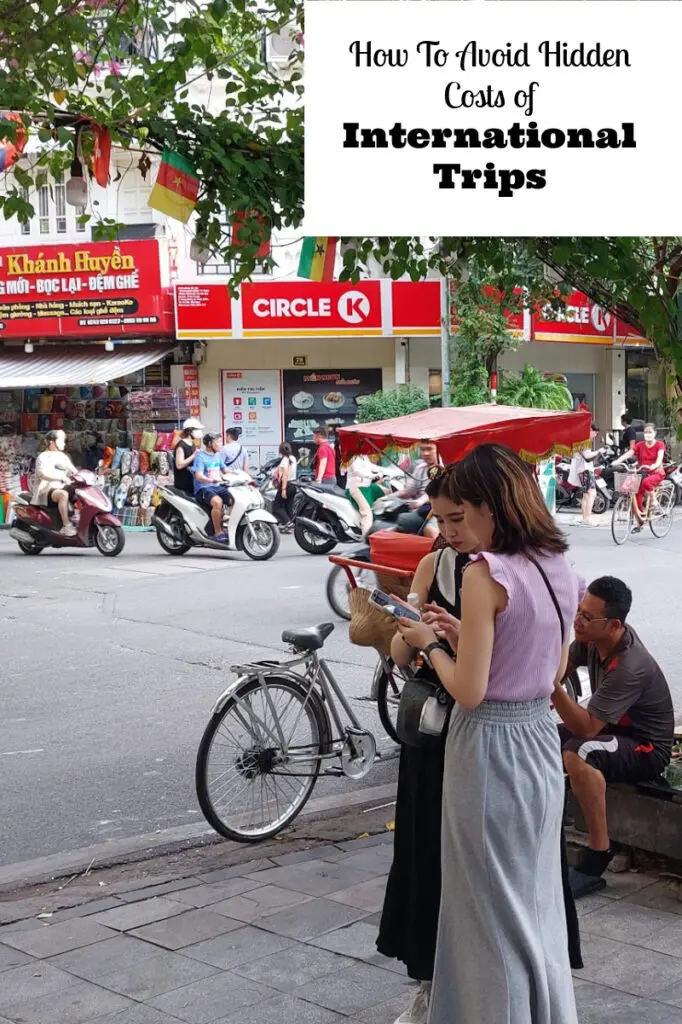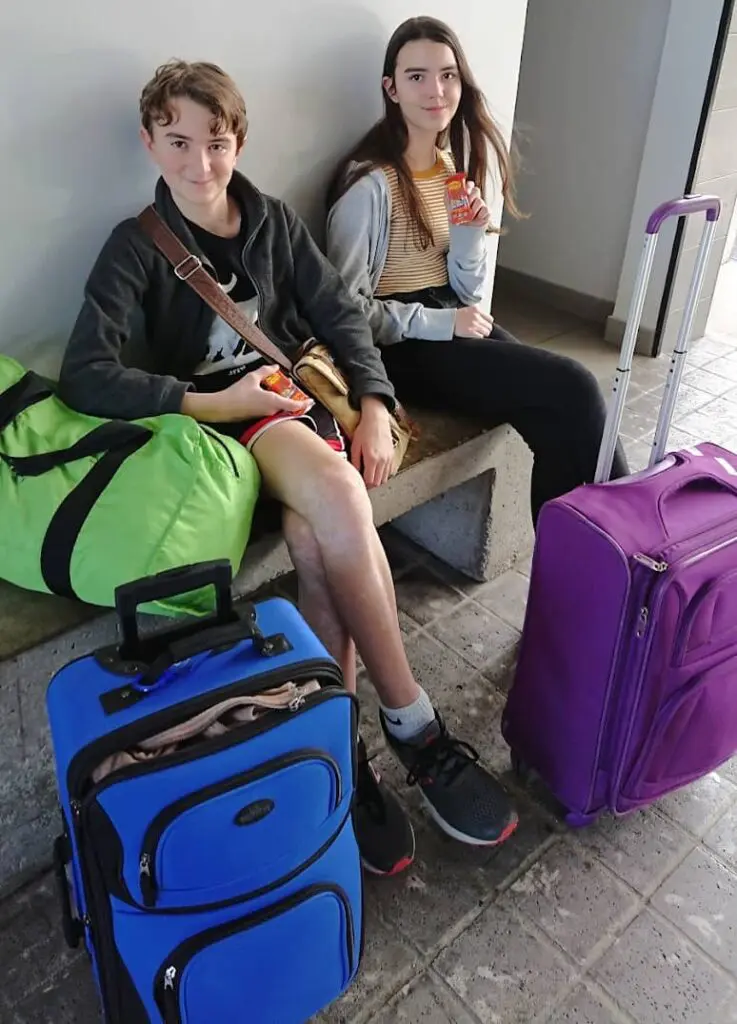Traveling abroad can be an exciting adventure, but it often comes with more expenses than just plane tickets and hotel stays. From unexpected fees to overlooked daily costs, the hidden price of traveling overseas can quickly add up if you’re not prepared. The good news is, with a little planning and awareness, you can avoid many of these surprise charges and keep your international trips both enjoyable and budget-friendly. In this guide, we’ll explore some of the most common hidden costs of international travel and share practical tips to help you plan ahead.

Surprising Travel Abroad Expenses (and How to Cut Them)
Traveling abroad is an outstanding chance to see new places, appreciate other cultures, and make friends. It broadens your horizons and is even scientifically proven to improve your mental health!
Yet, being a tourist is expensive, especially if you don’t pay enough attention to the hidden costs. If you don’t want to return home with an empty wallet, here’s what you must look out for.
1. Currency Exchange Rates & ATM Fees
Many small vendors only accept cash in foreign countries. However, poor exchange rates and added withdrawal fees can eat into your budget.
Solution: Plan ahead by a debit card that reimburses ATM fees. Avoid airport exchange counters with unfavorable rates, and instead withdraw larger amounts less frequently from reputable ATMs to minimize fees. Checking your bank’s partnerships with international banks can also help reduce charges.
2. Dynamic Currency Conversion (DCC)
When you are traveling internationally, you might prefer to use your credit card to pay for food and events. But did you know that paying in your home currency can rack up conversion fees? Dynamic currency conversion, or DCC for short, is the reason why you can purchase things priced in different currencies. However, this service charges a percentage as a fee, subjecting you to poor exchange rates.
Solution: Whether using your debit or credit card, do not allow the merchants to pick your home currency for payments. Instead, choose the local currency and avoid unfavorable exchange rates through DCC.
3. Foreign Transaction Fees
When experiencing international travel, not only do you pay conversion fees, but you might also be charged foreign transaction fees on some cards. Ranging from 1% to 3%, these fees are typically small but can snowball throughout your trip from many transactions.
Solution: Before traveling, ask your bank about a credit card with no foreign transaction fees. If they offer one, consider choosing a traveler-friendly card to avoid these extra costs when going abroad.

4. Roaming Charges and Expensive Local SIM Cards
Roaming charges are always high when using mobile internet from your regular SIM card. Even purchasing local SIMs can be a trap, since they usually cost a lot, especially in the airport and in tourist areas. Everyone want to document and their trip with photos and share them on social media these days.
Solution: Invest in a good eSIM plan. For example, let’s say your first stop is Madrid, with an eSIM for Spain, you sort all connectivity needs. If your roadmap includes another country, instead of constantly swapping cards, you just select a new plan for the country of your destination. With eSIMs, your mobile connection will always be secure and reliable – without additional fees or charges.
5. Baggage Fees
You must have heard of baggage fees if you have ever taken a flight. Overhead bins are practically cramped everywhere, and getting a checked bag or oversized carry-on on board is impossible for free. Depending on the airline, these fees can be pretty steep. And if you’re a fan of bringing back souvenirs for every friend and family member, this can quickly become a challenge.
Solution: Stick to essentials and rely only on carry-on luggage. Create a functional and minimalistic wardrobe so you don’t have to pack many clothes on a trip. In case you need more things or clothes for your trip, consider shipping them internationally to save some money.

6. Overpriced Airport Services
Snacks, drinks, and baggage storage are notoriously overpriced at airports. The worst part is that once you go through the security check, you don’t have a choice but to purchase the necessities and pay for the services you need at the airport.
Solution: Always take some food and water with you, especially if you suspect your flight might be delayed due to weather changes or if you have a long layover period. Packed snacks come in handy, especially for kids while traveling.
7. Tourist Taxes
Tourist taxes are often paid for accommodation and small services at local hotels, hostels, apartments, and other rentals. These fees might be included in your bills upfront, or you might have to pay them when checking out. However, when booking a stay online, these taxes are often obscured in the fine print, leaving many travelers facing unexpected expenses at the end of their stay.
Solution: Do thorough research about the place you want to stay before paying the booking fee. Knowing which and how much tourist taxes you have to pay can prevent unpleasant surprises and help you better estimate your budget capabilities.
8. Unreliable WiFi and Cybersecurity Threats
Relying on public WiFi networks at airports, cafes, and hotels may seem convenient, but it comes with significant risks. Public networks are often unsecured, making them a hotspot for hackers seeking to intercept your sensitive data, such as passwords, financial details, or personal correspondence. Additionally, some public WiFi networks may have slow speeds or may not reliably support video calls or heavy downloads, causing inconvenience during your trip.
Solution: Protect yourself by investing in a Virtual Private Network (VPN). The best VPNs encrypt your internet connection, ensuring that your data remains private, even when using public networks. Additionally, consider downloading offline maps, guides, and entertainment beforehand to reduce dependency on unreliable WiFi connections.

9. Transportation Costs
Airport transfers, taxis, ride-shares, and unexpected surcharges can add up.
Solution: Research your transportation options before you arrive so you’re not stuck paying premium prices. Public transit, shuttle buses, or pre-booked airport transfers are often far cheaper than last-minute taxis or ride-shares. If you do use taxis, confirm the fare upfront or make sure the meter is running to avoid surprise charges. Walking or using day passes for buses and trains can also keep your costs low while letting you experience the city like a local.
10. Travel Insurance
Essential for peace of mind, but often overlooked in the budget.
Solution: Don’t skip travel insurance—shop around for plans that cover medical emergencies, trip cancellations, and lost luggage. Compare coverage options and prices from reputable providers, and choose a plan that fits the length and activities of your trip. Buying insurance when you book your international trips can save money when disaster strikes and ensure you’re covered from the start.
Conclusion On How To Save On Unexpected International Travel Fees
If you don’t pay enough attention to hidden fees, your international travels can become much more expensive than you initially thought they would. However, using the tips we provided above can help you avoid things like DCC, foreign transaction fees, tourist taxes, and overpriced services. So, be sure to employ them and enjoy your international travel!
Related Posts:

Wanda says
Great reminder! Travel insurance really is one of those things people overlook until they need it. I like how you explained that it doesn’t have to be super expensive if you shop around, and it definitely brings peace of mind when traveling overseas.
Courtney says
I was shocked to find out that many credit cards charge extra for purchases abroad. I had no idea. Thanks for the heads up.
Noim says
Who knew traveling internationally could feel like navigating a maze of hidden fees? This article is a hilarious reality check, exposing all the sneaky charges trying to make your trip cost more than your vacation photos! From the notorious DCC that makes your home currency disappear, to the sheer madness of baggage fees and tourist taxes hidden in fine print, its like a comedy of errors. The solutions, though practical, almost sound like youre trying to outsmart the system – packing light, bringing snacks, and researching like a spy! Honestly, its a must-read for anyone whos ever stared at a confusing airport menu and thought, Do I really need this $20 coffee? A well-deserved wake-up call for savvy travelers!
Nano says
This article is a lifesaver for anyone planning international trips! Ive been burned by Dynamic Currency Conversion and hidden baggage fees before, so these tips are incredibly helpful. The advice on avoiding roaming charges and choosing the right travel insurance is gold. However, I think the section on eSIMs is a bit too tech-focused—maybe explain it for absolute beginners? Also, more about bargaining in tourist areas wouldve been useful. But overall, a must-read for saving money and stress on the go. Five stars!
Star says
This article is a lifesaver for international travelers like me! Ive fallen into so many traps with Dynamic Currency Conversion and hidden tourist taxes. The tips about using local currency and choosing the right credit card are gold. The section on eSIMs is a game-changer too – I never thought about that until now. The advice on avoiding baggage fees by packing light and using public transport instead of taxis is super practical. And dont even get me started on those overpriced airport snacks! Definitely sharing this with my friends who love to travel. Thanks for the real-world advice that actually helps you save money!
Future says
Great breakdown! Many travelers overlook these hidden costs until it’s too late. Planning ahead and budgeting wisely can really save a lot of stress and money.
Christi says
Wow, I didn’t realize how many hidden costs could sneak up on travelers! Thanks for breaking it down so clearly it’ll make my next trip much less stressful.
devirsoft says
This is such a practical and eye-opening guide—it highlights hidden travel costs we often overlook while also giving clear, easy-to-follow solutions to avoid them.
Ruby Sienna says
This is an incredibly practical and eye-opening guide for international travelers! You’ve highlighted crucial often-overlooked expenses that can derail a budget, from dynamic currency conversion fees to unexpected tourist taxes. Your proactive tips for avoiding these hidden costs are invaluable for stress-free planning. This should be essential reading for anyone wanting to explore the world without financial surprises. Fantastic advice!